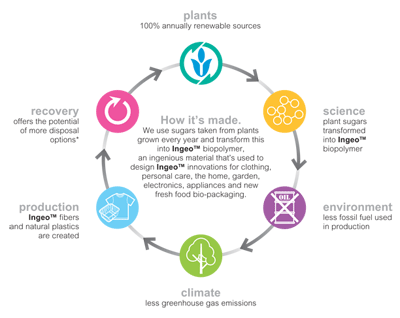 Ingeo™ is a unique bio-based material made from plants instead of oil. It was introduced globally in 2003 by NatureWorks LLC, a company dedicated to more sustainable and environmental product and business development.
Ingeo™ is a unique bio-based material made from plants instead of oil. It was introduced globally in 2003 by NatureWorks LLC, a company dedicated to more sustainable and environmental product and business development.
NatureWorks’ patented technology was the first to industrialize the conversion of sugars to bioplastics. The commercial scale of the process meant that a range of Ingeo™ biopolymer lifestyle products could become a real and better alternative to fossil fuel resourced products around the world today.
From natural plastics for food and beverage packaging, to serviceware, consumer electronics, durable goods, and even fiber for clothing, Ingeo™ offers consumers alternatives for lifestyle products of natural origin rather than of petroleum.
The Source
NatureWorks currently uses plant sugars derived from 100% annually renewable field corn as the source material for manufacturing Ingeo™. This corn is already grown for many industrial and functional end-uses. In context, Ingeo™ uses less than 1/20th of 1% (0.05%) of the annual global corn crop today, and as such contributes little to no impact on international or local food chains.
Ingeo™ doesn’t require corn, it only needs a sugar source, whatever is most readily available depending on the geography. In the future, Ingeo™ will be made from cellulosic raw materials, agricultural wastes and non-food plants.
Outstanding Features for Packaging
For a wide variety of food/beverage packaging and service applications, Ingeo™ performs just as well or better than traditional plastics in:
- Appearance — excellent gloss, transparency and clarity for containers and bottles.
- Food preservation — exceptional flavor and aroma barrier properties, allowing things to taste like the day they were made
- Versatility — easy to shape, mold, emboss and print
- Safety — Ingeo™ natural plastic does not contain any Bisphenol A (BPA) and is food-grade compliant
- Rigid packaging — good form and stiffness properties with lower density makes for lighter packages compared to PET
- Foam packaging — a long sought-after alternative to polystyrene foam that has great moisture barrier properties, is lightweight, tough and safe for use with meat products, dairy and whole eggs
- Flexible films — excellent folding and twist fold capabilities, superb printability, and easier shrink properties than conventional films
- Paper Coatings — functions well in hot and cold drink applications, with good moisture, grease and oil resistance
- Disposal options — offers more end-of-life options: mechanical and chemical recycling, clean incineration and industrial composting
Product End of Life — Composting
NatureWorks strongly supports the concept of zero waste, beginning with diverting food waste from landfills.
Unfortunately today, most compostable food waste around the world is literally ‘contaminated’ with petroleum based plastics — the presence of which condemn food waste to landfill, rather than more environmentally beneficial composting. A truly compostable, plant-based solution like Ingeo™ offers enormous potential, enabling the composting of the entire waste stream from food service operations.
Product End of Life — Recycling
Unlike conventional oil based plastics, Ingeo™ can be simply and economically recycled. For instance, an Ingeo™ bottle can be remade into another bottle again and again. By contrast, oil-based incumbent plastic bottles are typically “down-cycled” into products of diminishing value such as decking, and are ultimately destined for landfill.
Through recycling, Ingeo™ can provide economically viable, true closed-loop, cradle-to-cradle solutions to zero waste. However, identifying Ingeo™ bioplastic and paperboard in the recycle stream is the challenge.
Currently, near-infrared sorting is the industry’s preferred plastics sorting technology because it can accurately identify the multiple different polymers already in use today (different polymers reflect an identifiable light spectrum — a unique ‘fingerprint’). Tests on present-day sorting technology used widely by recyclers prove that Ingeo™ can be identified in the mixed waste plastic with very high accuracy.
Working together towards the goal of zero waste
NatureWorks advocates recycling, composting and the concept of zero waste wherever possible.
While current waste reduction systems are evolving, continued success relies on partnerships and momentum. Once there is critical mass of material available to process, comprehensive recovery and municipal/commercial composting systems will successfully emerge.
NatureWorks supports initiatives to achieve best results through local infrastructure, collection and processing to reach these targets, and anticipates inevitable legislation designed to reduce waste.
